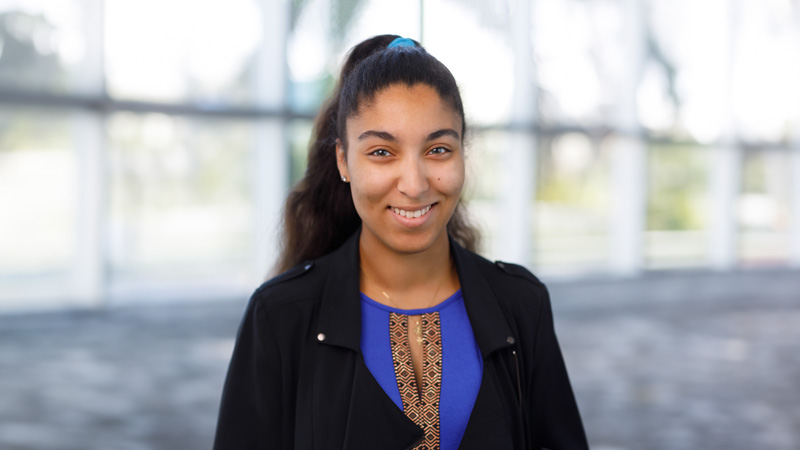
Credit: Scripps Research
Inès Forrest, a fourth-year graduate student in the laboratory of Associate Professor Christopher Parker, has been named a 2024 CAS Future Leader, an honor given annually to only 35 graduate students and postdoctoral researchers around the world.
The award is administered by Chemical Abstracts Service (CAS), a division of the American Chemical Society, which describes the Future Leaders program as one that “supports the growth of science leadership among early-career scientists,” while providing doctoral students and postdocs with “opportunities to learn leadership skills, engage in scientific discourse, and connect with peer scientists and innovators from around the world.”
Forrest’s work in Parker’s lab in the Department of Chemistry involves the development of a new way to use chemical tools to study human proteins, especially those linked to cancers, neurodegeneration and autoimmune diseases.
“My research focuses on developing a way to harness the cell’s natural disposal system to eliminate proteins that can be responsible for diseases using specialized chemical probes,” explains Forrest. “The power of this approach lies in the fact that we can, in theory, target almost any protein for this degradation process. From there, we aim to make these compounds more selective and explore their potential as future treatments for disease.”
“Inès is truly a multi-talented leader—not only did she spearhead the chemical design and synthesis,” says Parker, Forrest’s thesis advisor, describing her approach to this ambitious project as an example of why she was a perfect choice for this award. “But she also became an expert in proteomics, molecular biology and cellular biology. She also is a main point person for an industry collaboration for this project, which is quite remarkable at an early-stage graduate career level.”
Challenges experienced in her youth drove Forrest to excel academically and ultimately discover a passion for research. After her aunt passed away from cancer, she decided to dedicate herself to improving people’s lives through science. Prejudice she encountered along the way only hardened her resolve.
“When I was younger, I faced a lot of discrimination because of the color of my skin,” she says. “I found refuge in education, particularly in science, and developed an insatiable curiosity to learn more. I’m so inspired by the unlimited possibilities that science offers – the chance to unravel mysteries and the potential to make groundbreaking discoveries that can positively impact humanity for generations to come.”
Beyond any impact she hopes to make through her research, Forrest also feels strongly about the importance of inspiring and opening doors of opportunity for future scientists.
“I am the first to pursue a PhD in my family, so I had to forge this unique path,” she says. “I aspire to show individuals from diverse backgrounds—who may not have had the same opportunities as others or their peers at similar stages—that achieving their desired goals is not an insurmountable task.”
This is not the first time Forrest has earned accolades for her research and achievements in graduate school. In 2022, she was named one of 140 recipients of a Ford Foundation Fellowship, a coveted predoctoral award administered by the National Academies of Sciences, Engineering and Medicine.
Focused on leadership training and networking, the CAS Future Leaders program will award Forrest and her cohort with a weeklong visit to CAS Headquarters in Columbus, Ohio in August where they’ll meet other emerging leaders from around the world. From there, program participants will travel to the ACS Fall 2024 meeting in Denver, Colorado, where they’ll have an opportunity to present their research and participate in an ACS Professional and Leadership Development course. Honorees also receive a cash award, three-year ACS membership and lifetime membership in the CAS Future Leaders Alumni Community.